#minister of coal
Explore tagged Tumblr posts
Text

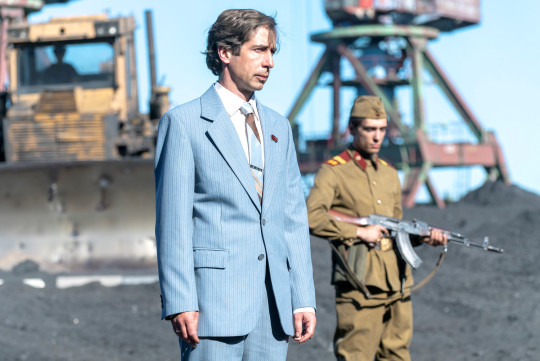

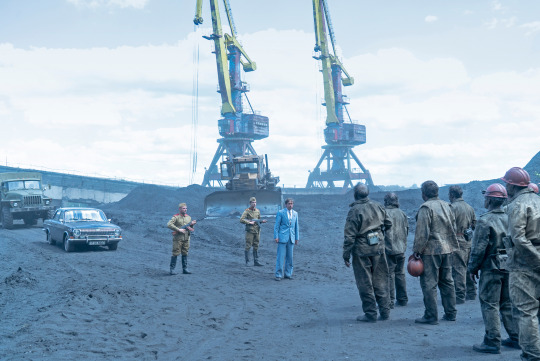
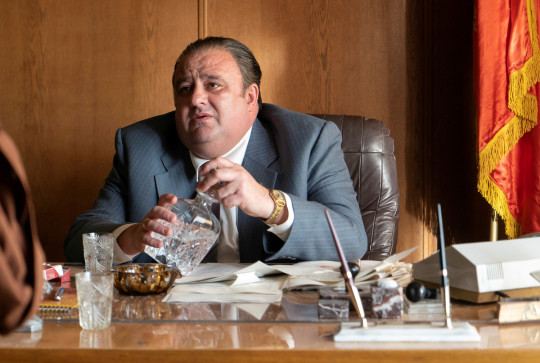
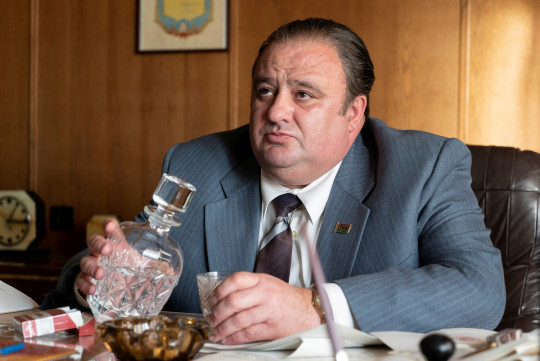
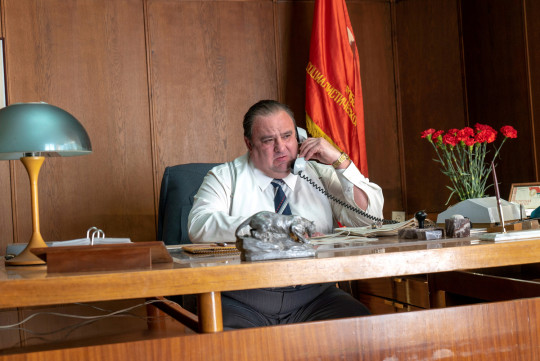

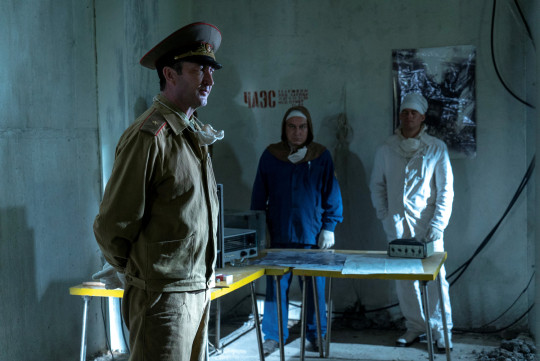
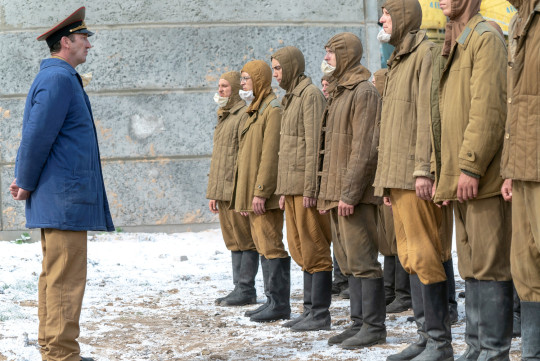
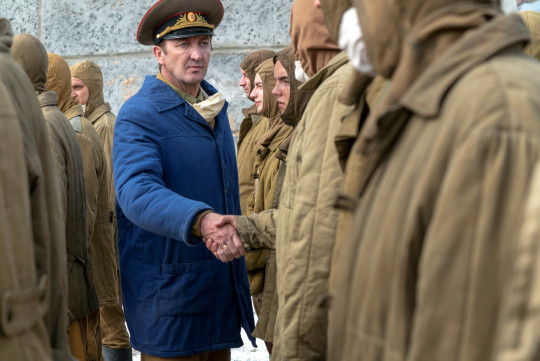
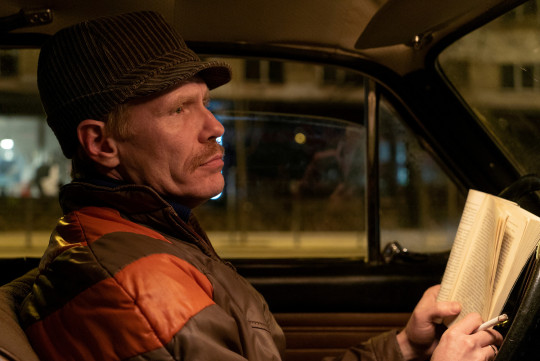

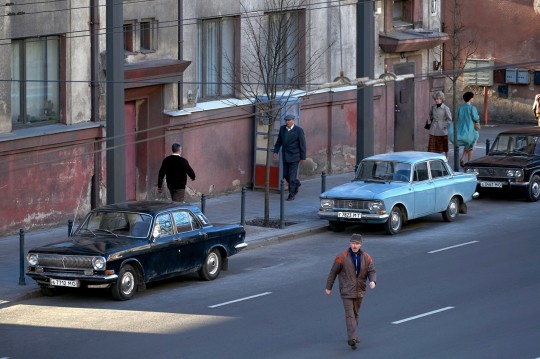

Putting all these high res beauties in one place.
#chernobyl#craig mazin#michael colgan#michael hughes#schadov#minister of coal#garanin#victor mcguire#tarakanov#ralph ineson#michael shaeffer#kgb#blond man#misha#valery's blanket#deleted scene
11 notes
·
View notes
Text
the only thing australia cares about maintaining is the wellbeing of like 50 corporations and their ceos
18 notes
·
View notes
Text
Second political post of the day: remember when Biden was elected and all these random eurotrash and Canadian people were like “yay, welcome back, America, we can somewhat respect you again” only now our country is astronomically shittier than it was when the Orange guy was president? Hmmmm. Perhaps we shouldn’t care about what other countries think about us, yes, including our “allies”, because they do not have our best interests in mind. They just use us for our military so they can have free healthcare and free college education, only to shit on us constantly like the assholes they are
#the uk has had like 100 prime ministers within the last five years all of which have been shit so I don’t care about their opinions#the French are never happy with anyone they elect so maybe we shouldn’t listen to their bad judgement#Canada is literally a fucking joke of a country. how can a country with fewer people than California that’s near the same size as the USA#have a housing crisis? build more houses you dumbasses you literally have so much empty space it’s unbelievable#and they continuously vote in Trudeau’s party; so again they don’t have good judgement#and I didn’t mention any other countries in Europe besides the uk and France because the rest are all just background people to me tbh#except Germany but those idiots closed all their nuclear plants and now burn more coal for power but bitch at everyone about climate change
2 notes
·
View notes
Text
Coal Minister's Dhanbad Visit Focuses on Jharia Fire Zone and Rehabilitation
G Kishan Reddy to Assess Coalfield Fires, Meet Affected Residents During Two-Day Tour Union Coal Minister G Kishan Reddy embarks on a crucial visit to Dhanbad, aiming to address the longstanding issue of coalfield fires and resident rehabilitation in the Jharia region. DHANBAD – Union Coal Minister G Kishan Reddy has initiated a two-day tour of Dhanbad, focusing on the critical situation in the…
#राज्य#BCCL development projects#coal fire rehabilitation efforts#Coal India Limited initiatives#Dhanbad coal production strategies#G Kishan Reddy Jharkhand tour#Jharia coalfield fire zone#Jharia fire-affected residents#Jharia Master Plan review#Jharkhand coal sector challenges#state#Union Coal Minister Dhanbad visit
0 notes
Text
Colombia's president Gustavo Petro has signed an order suspending coal exports to Israel
“With Colombian coal they make bombs to kill the children of Palestine,” said Sunday Colombian president Gustavo Petro in his X account, echoing the decree published by the media. Thus, “exports to the State of Israel of thermal coal” are prohibited, according to the decree, which was signed by several ministers, including the chancellor, Luis Gilberto Murillo, on 14 August and will enter into force next week, despite the fact that the ban was already announced by Petro in June. Fuels and products of extractive industries, including coal, are the main export of Colombia, and between January and June they have cost the country 11,689 million dollars, with the United States being the main destination.

#yemen#jerusalem#tel aviv#current events#palestine#free palestine#gaza#free gaza#news on gaza#palestine news#news update#war news#war on gaza#colombia#boycott divest sanction#bds movement#gaza genocide#genocide
3K notes
·
View notes
Note
I just spent some time scrolling through this blog and am suffering from sever laughter. Thanks so much for collating the countries craziest moments. One of my favourites is when Scott Morrison was in Hawaii while the bushfires where burning.
December 2019: As Australia's east coast is engulfed in the worst bushfires in living memory, rumours begin to circulate that Australia's Prime Minister Scott Morrison may have secretly fucked off for a holiday in Hawaii.
Keep in mind, this is what is going down in Australia at the time:

The Hawaii rumour is initially written off as a fringe conspiracy, because surely nobody could be that fuckin tonedeaf, and it was quickly forgotten about... until an Australian man visiting Hawaii UPLOADED A SELFIE ON THE BEACH WITH THE PM THROWING A SHAKA.
At which point all hell broke loose.

Overnight the formerly popular "Scomo" became the most despised man in all of Australia. Think "firefighters shouting out of their windows to news cameras" level of despised.
After about two days of radio silence and pretending like he was still at home running the country, the Prime Minister's handlers finally dragged him onto call with an Australian radio station, where he pinky promised to return to Australia as fast as he could in an attempt to calm things down.
Unfortunately Scott's empathy consultant (a real job) then had to watch Scott pour more gasoline on the dumpster fire by uttering the now famous phrase "Look I don't hold a hose mate" when asked by the radio interviewer why the fucking fuck the fuckhead wasn't fucking in Australia doing his fucking job during a massive fucking crisis.
Testing just how much worse things could get, Scomo then proceeded to NOT rush back to Australia as promised, instead attempting to complete the rest of his holiday, a fact that was exposed when a passerby snapped a picture of him still lounging on the beach two days later.

Eventually, holiday complete, Morrison did reluctantly slink back to Australia, and in an attempt to calm things down, he decided to pay a visit to a small town that had been destroyed by the fires.
Which was a big mistake.
Scomo still had not registered how absolutely and totally he had screwed the poodle with his Hawaiian beach vacation, and he walks into what is now taught in PR classes as one of the greatest examples of "what not do do in a crisis" in all of history.
Scotty from Marketing, as he is now dubbed by the nation, spends a painfully cringe-inducing hour wandering around a burned down town with TV news cameras in tow, having to FORCE PEOPLE TO SHAKE HIS HAND in what is some of the most awkward footage you will ever see.
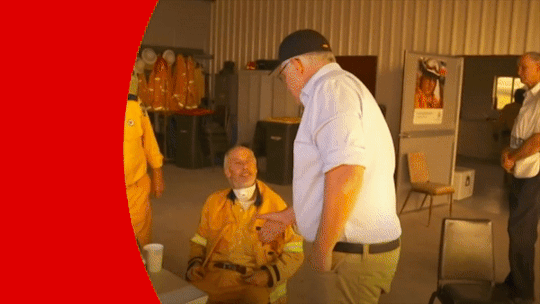

At this point it's probably also worth mentioning that, before becoming Prime Minister, Scott Morrison's biggest claim to fame in politics was being the guy that was so far up the coal lobby's arse that he literally brought coal into parliament and waved it around, claiming it doesn't hurt people.
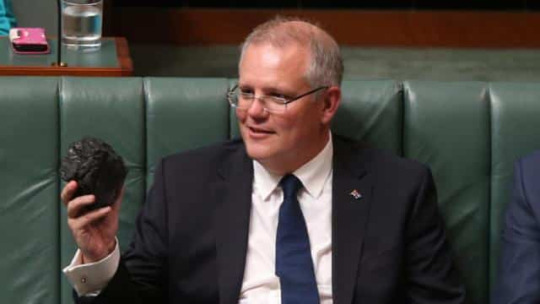
So when a protest was organised it turned out to be one big national fuck you to the Prime Minister, the likes of which the world has never seen before or since.
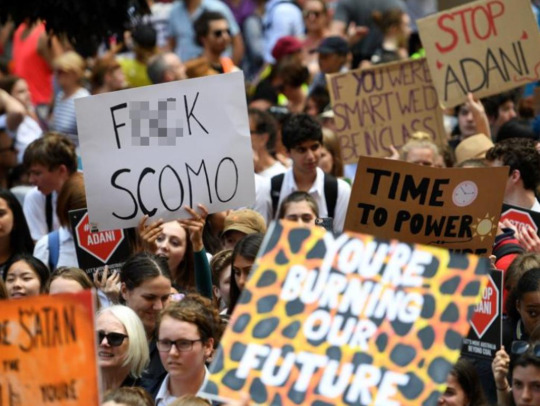
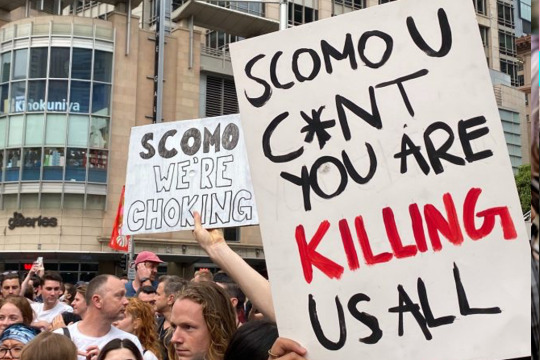

Needless to say, at this point Scomo's career was dead in the water, but thanks to the rules brought in to stop Australian political parties from knifing their leader every two weeks (a popular Aussie passtime) Morrison basically couldn't get fired until after the next election.
And so, when the election rolled around in 2022, we decided that was an opportune time to travel over to Hawaii to erect this bad boy tribute to the Prime Minister, on the very beach where Scomo had sat and drank margaritas that one fateful week in December as Australia burned (thanks to @chaser for funding the ticket)
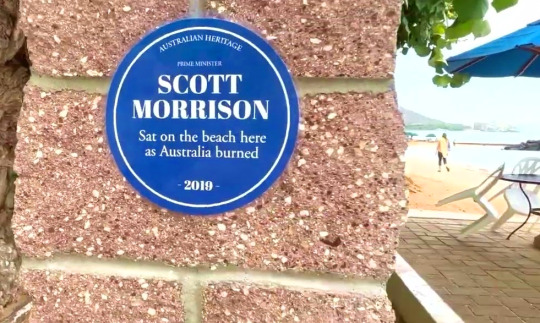
9K notes
·
View notes
Text
"The suffragettes are instructive. Their tactic of choice was property destruction. Decades of patient pressure on the Parliament to give women the vote had yielded nothing, and so in 1903, under the slogan 'Deeds not words, the Women's Social and Political Union was founded. Five years later, two WSPU members undertook the first militant action: breaking windowpanes in the prime minister's residence. One of them told the police she would bring a bomb the next time. Fed up with their own fruitless deputations to Parliament, the suffragettes soon specialised in 'the argument of the broken pane', sending hundreds of well-dressed women down streets to smash every window they passed. In the most concentrated volley, in March 1912, Emmeline Pankhurst and her crews brought much of central London to a standstill by shattering the fronts of jewellers, silversmiths, Hamleys toy shop and dozens of other businesses. They also torched letterboxes around the capital. Shocked Londoners saw pillars filled with paperthrowing up flames, the work of some activist having thrown in a parcel soaked in kerosene and a lit match.
Militancy was at the core of suffragette identity: 'To be militant in some form, or other, is a moral obligation, Pankhurst lectured. 'It is a duty which every woman will owe her own conscience and self-respect, to women who are less fortunate than she is herself, and to all who are to come after her.' The latest full-body portrait of the movement, Diane Atkinson's Rise Up, Women!, gives an encyclopedic listing of militant actions: suffragettes forcing the prime minister out of his car and dousing him with pepper, hurling a stone at the fanlight above Winston Churchill's door, setting upon statues and paintings with hammers and axes, planting bombs on sites along the routes of royal visits, fighting policemen with staves, charging against hostile politicians with dogwhips, breaking the windows in prison cells. Such deeds went hand in hand with mass mobilisation. The suffragettes put up mammoth rallies, ran their own presses, went on hunger strikes: deploying the gamut of non-violent and militant action.
After the hope of attaining the vote by constitutional means was dashed once more in early 1913, the movement switched gears. In a systematic campaign of arson, the suffragettes set fire to or blew up villas, tea pavilions, boathouses, hotels, haystacks, churches, post offices, aque-ducts, theatres and a liberal range of other targets aroundthe country. Over the course of a year and a half, the WSPU claimed responsibility for 337 such attacks. Few culprits were apprehended. Not a single life was lost; only empty buildings were set ablaze. The suffragettes took great pains to avoid injuring people. But they considered the situation urgent enough to justify incendiarism - votes for women, Pankhurst explained, were of such pressing importance that we had to discredit the Government and Parliament in the eyes of the world; we had to spoil English sports, hurt businesses, destroy valuable property, demor-alise the world of society, shame the churches, upset the whole orderly conduct of life. Some attacks probably went unclaimed. One historian suspects that the suffragettes were behind one of the most spectacular blazes of the period: a fire in a Tyneside coal wharf, in which the facilities for loading coal were completely gutted. They did, however, claim responsibility for the burning of motor cars and a steam yacht."
- How to Blow Up a Pipeline, pg 40-42
694 notes
·
View notes
Text
January 2025 Witch Guide
New Moon: January 29th
First Quarter: January 6th
Full moon: January 13th
Last Quarter: January 21nd
Sabbats: None
January Wolf Moon
Also known as: Bear Moon, Center Moon, Chaste Moon, Cold Moon, Disting Moon, Freeze Up Moon, Frost Exploding Moon, Goose Moon, Great Moon, Greetings Moon, Hard Moon Ice Moon, Moon of the Little Winter, Quiet Moon, Severe Moon, Spirt Moon & Snow Moon
Element: Air
Zodiac: Capricorn & Aquarius
Nature spirts: Brownies & Gnomes
Deities: Chang'e, Freya, Hera, Inanna & Saraswati
Animals: Coyote & fox
Birds: Blue Jay & pheasant
Trees: Birch & Hazel
Herbs: Cones, holy thistle& marjoram
Flowers: Crocus & snowdrop
Scents: Mimosa & musk
Stones: Chrysoprase, garnet, hematite, moonstone, onyx, jet, red tourmaline rose quartz & ruby
Issues, intentions & powers: Beginnings, healing, money, protection & strength
Energy: Adventure, ambition, awareness, beauty, beginnings, business, career, conserving energy, energy below the surface, organization, potential, protection, recognition, reputation, reversing spells, sluggish & spiritual
January’s full Moon came to be known as the Wolf Moon because wolves were more likely to be heard howling at this time. Though it was traditionally believed that wolves howled due to hunger during winter, we know today that isn’t accurate.
Howling & other wolf vocalizations are heard in the wintertime to locate pack members, reinforce social bonds, define territory & coordinate hunting. One study recorded spontaneous howls and responses happen most often between 11 p.m. and 6 a.m. .
• According to the Wolf Conversation Center, gray wolves “inhabited most of the available land in the Northern Hemisphere.” Habitat destruction & persecution by humans have reduced their range by about a third worldwide & 90% in the lower 48 states.
Other celebrations:
• Hogmanay: December 31st- January 1st-
Christmas was not celebrated as a festival and virtually banned in Scotland for around 400 years. So it was, right up until the 1950s that many Scots worked over Christmas & celebrated their winter solstice holiday at New Year, when family & friends would gather for a party and to exchange presents which came to be known as hogmanays.
Customs vary throughout Scotland & usually include gift-giving & visiting the homes of friends & neighbors. Another common Hogmanay tradition is to clean the house. Some believe that beginning the New Year with an unclean house may bring bad luck. Traditionally, this would include taking out the ashes from the coal fire.
• Particular attention is given to the first-foot(is the first person to enter the home of a household on New Year's Day and is seen as a bringer of good fortune for the coming year bearing coal to ensure the house remains warm in the coming months & should traditionally be a tall, dark-haired man.)
• Compitalia/ Feast of Lades: January 3-5-
Was an annual festival in honor of the Lares Compitales, household deities of the crossroads, to whom sacrifices were offered at the places where two or more ways met. Dionysius said that Servius Tullius founded the festival, which he describes as it was celebrated in his time. Dionysius relates that the sacrifices consisted of honey-cakes (Ancient Greek: πέλανοι) presented by the inhabitants of each house; & that the people who assisted as ministering servants at the festival were not free men, but slaves because the Lares took pleasure in the service of slaves. He further adds that the Compitalia were celebrated a few days after the Saturnalia with great splendor & that the slaves on this occasion had full liberty to do as they pleased.
During the celebration of the festival, each family placed the statue of the underworld goddess Mania at the door of their house. They also hung up at their doors figures of wool representing men & women, accompanying them with humble requests that the Lares & Mania would be contented with those figures, and spare the people of the house.
• Lunar New Year: January 29th-
The Lunar new year (Commonly referred as Chinese New Year) is one of the most important holidays in Chinese culture marking the end of winter & the beginning of the spring season, observances traditionally take place from New Year's Eve, the evening preceding the first day of the year to the Lantern Festival, held on the 15th day of the year. The new year starts on the new moon nearest the midpoint between the winter solstice & the spring equinox, sometime between January 21 and February 20.
• This holiday has ancient roots in China as an agricultural society. It was the occasion to celebrate the harvest & worship the gods & ask for good harvests in times to come
Each culture celebrates the Lunar New Year differently with various foods and traditions that symbolize prosperity, abundance & togetherness. In preparation for the Lunar New Year, houses are thoroughly cleaned to rid them of inauspicious spirits, which might have collected during the old year. Cleaning is also meant to open space for good will and good luck.
Some households hold rituals to offer food & paper icons to ancestors. Others post red paper and banners inscribed with calligraphy messages of good health and fortune in front of & inside, homes. Elders give out red envelopes containing money to children. Foods made from glutinous rice are commonly eaten, as these foods represent togetherness. Other foods symbolize prosperity, abundance & good luck.
The origins of the Lunar New Year festival are thousands of years old & are steeped in legends. One legend is that of Nian, a hideous beast believed to feast on human flesh on New Year's day. Because Nian feared the color red, loud noises & fire, red paper decorations were pasted to doors, lanterns were burned all night, and firecrackers were lit to frighten the beast away.
Sources:
Farmersalmanac .com
Llewellyn's Complete Book of Correspondences by Sandra Kines
Wikipedia
A Witch's Book of Correspondences by Viktorija Briggs
Encyclopedia britannica
Llewellyn 2025 magical almanac Practical magic for everyday living
https://www.edinburghfestivalcity.com/festivals/edinburghs-hogmanay
#January 2025 Witch Guide#january 2025#wolf moon#witchblr#wiccablr#spiritual#witches of tumblr#tumblr witches#witchcraft#witch#paganblr#witch community#witches supporting witches#witchcore#witch guide#witch tips#beginner witch#baby witch#beginner witch tips#baby witch tips#traditional witchcraft#witchcraft 101#grimoire#spellbook#book of shadows#lunar new year#hogmanay#witch friends#witchy things#spellwork
211 notes
·
View notes
Text
The UK will import carbon to bury it in the ground for other countries, a minister has predicted. Industry minister Sarah Jones said the £20bn investment in carbon capture and storage projects will make the UK the world leader in the technology.
The reverse coal mine
226 notes
·
View notes
Note
lol philadelphia inquirer bodying nyt
https://www.inquirer.com/opinion/editorials/first-presidential-debate-joe-biden-donald-trump-withdraw-20240629.html
President Joe Biden’s debate performance was a disaster. His disjointed responses and dazed look sparked calls for him to drop out of the presidential race.
But lost in the hand wringing was Donald Trump’s usual bombastic litany of lies, hyperbole, bigotry, ignorance, and fear mongering. His performance demonstrated once again that he is a danger to democracy and unfit for office.
In fact, the debate about the debate is misplaced. The only person who should withdraw from the race is Trump.
Trump, 78, has been on the political stage for eight years marked by chaos, corruption, and incivility. Why go back to that?
To build himself up, Trump constantly tears the country down. There is no shining city on the hill. It’s just mourning in America.
Throughout the debate, Trump repeatedly said we are a “failing” country. He called the United States a “third world nation.” He said, “we’re living in hell” and “very close to World War III.”
“People are dying all over the place,” Trump said, later adding “we’re literally an uncivilized country now.”
Trump told more than 30 lies during the debate to go with the more than 30,000 mistruths told during his four years as president. He dodged the CNN moderators’ questions, took no responsibility for his actions, and blamed others, mainly Biden, for everything that is wrong in the world.
Trump’s response to the Jan. 6, 2021, insurrection he fueled was farcical. He said a “relatively small number of people” went to the Capitol and many were “ushered in by the police.”
After scheming to overturn the 2020 election, Trump refused to say if he would accept the results of the 2024 election. Unless, of course, he wins.
The debate served as a reminder of what another four years of Trump would look like. More lies, grievance, narcissism, and hate. Supporters say they like Trump because he says whatever he thinks. But he mainly spews raw sewage.
Trump attacks the military. He denigrates the Justice Department and judges. He belittles the FBI and the CIA. He picks fights with allies and cozies up to dictators.
Trump is an unserious carnival barker running for the most serious job in the world. During his last term, Trump served himself and not the American people.
Trump spent chunks of time watching TV, tweeting, and hanging out at his country clubs. Over his four-year term, Trump played roughly 261 rounds of golf.
As president, Trump didn’t read the daily intelligence briefs. He continued to use his personal cell phone, allowing Chinese spies to listen to his calls. During one Oval Office meeting, Trump shared highly classified intelligence with the Russian foreign minister and ambassador.
Trump’s term did plenty of damage and had few accomplishments. The much-hyped wall didn’t get built. Infrastructure week was a recurring joke. Giant tax cuts made the rich richer, while fueling massive deficits for others to pay for years. His support for coal, oil drilling and withdrawal from the Paris Agreement worsened the growing impact of climate change.
Trump stacked the judiciary with extreme judges consisting mainly of white males, including a number who the American Bar Association rated as not qualified. A record number of cabinet officials were fired or left the office. The West Wing was in constant chaos and infighting.
Many Trump appointees exited under a cloud of corruption, grifting and ethical scandals. Trump’s children made millions off the White House. His dilettante son-in-law got $2 billion from the Saudi government for his fledgling investment firm even though he never managed money before.
Trump’s mismanagement of the pandemic resulted in tens of thousands of needless deaths. He boasts about stacking the Supreme Court with extreme right-wingers who are stripping away individual rights, upending legal precedents, and making the country less safe. If elected, Trump may add to the court’s conservative majority.
Of course, there were the unprecedented two impeachments. Now, Trump is a convicted felon who is staring at three more criminal indictments. He is running for president to stay out of prison.
If anything, Trump doesn’t deserve to be on the presidential debate stage. Why even give him a platform?
Trump allegedly stole classified information and tried to overturn an election. His plans for a second term are worse than the last one. We cannot be serious about letting such a crooked clown back in the White House.
Yes, Biden had a horrible night. He’s 81 and not as sharp as he used to be. But Biden on his worst day remains lightyears better than Trump on his best.
Biden must show that he is up to the job. This much is clear: He has a substantive record of real accomplishments, fighting the pandemic, combating climate change, investing in infrastructure, and supporting working families and the most vulnerable.
Biden has surrounded himself with experienced people who take public service seriously. He has passed major bipartisan legislation despite a dysfunctional Republican House majority.
Biden believes in the best of America. He has rebuilt relationships with allies around the world and stood up to foes like Russia and China.
There was only one person at the debate who does not deserve to be running for president. The sooner Trump exits the stage, the better off the country will be.

271 notes
·
View notes
Text
Gold and coal
Johannes was a passionate influencer. When he felt like it. Actually, he only called himself an "influencer" because it sounded better than "slacker" or "professional son". He actually made a good living from his parents' money, which he spent at parties, shopping and traveling.
"So, what do you think of my cute new hat? I found it at this very cool market here in Ankara. It goes well with the necklace, doesn't it?" There were fewer likes on the picture than usual. Comments instead. Critical comments. Why he suddenly has such a beard. Johannes grabbed his chin. He had no beard, he had no beard growth at all. And he had carefully retouched the picture before posting it on Instagram. There had been no beard. But still: the photo above the caption clearly showed a beard…

He would have to deal with it later. Johannes had a full schedule. Working out at a gym, which surprisingly enough actually wanted to pay him, a visit to a Turkish bath and cocktails and dinner at a trendy rooftop bar in the evening. Even though Johannes was a hedonist, he was usually well organized and punctual. But at the gym, his schedule started to slip. He trained harder and longer than usual. He felt full of energy. And the traditional Turkish bath and hammam were fantastic. He met super interesting people there. Surprisingly, in the two weeks he had been traveling around Turkey, he had picked up more Turkish than he thought he would. He struck up conversations with people and they got on with each other using their hands and feet. Actually, he should have been up on the roof terrace, styled and with a gin and tonic in his hand, when he left the Turkish bath with a real Turkish stallion. The two of them had shagged like Johannes had never shagged before in his life. Johannes' hair was still oily from the scalp massage. He was sweating. His stallion asked him if they wanted to have another cup of tea and a shisha. They did. And then Johannes was fucked again in the stallion's apartment!

"as-salāmu ʿalaikum, brothers! Today will be a great day. I'm going on a tour of the insider tips in Ankara with my brother Hakan today. But now it's time to pray. salla Allahu 'alaihi wa sallam."
There was a hail of question marks as comments. Friends asked whether he had gone mad. But he also received positive feedback. Because of his style. Because of his faith. These comments were mostly in Turkish or Arabic. Both languages that Johannes (or Yahya, as he called himself here) understood more poorly than well. But he recognized praise in every language!
Hakan and Yahya had a great day. In public, they were the typical machos, but Hakan knew the places in Ankara where there was good, hard sex. Yahya sucked a minister's cock in the station toilet. And got 200 US dollars for an obviously good performance. Enough money for a good evening in the hammam and a good shisha afterwards.
The apartment that Hakan and Yahya shared was small and stuffy. The housing shortage in Ankara was no different to anywhere else in Turkey. But thanks to their small extra income, they at least had three rooms. Pure luxury for two people.

For Yahya, Instagram and other social media were actually just full of sin and Western decadence. But of course they were important media for receiving news from his brothers. His own account existed. Nothing more. He followed a handful of fellow believers who posted frequently, but he didn't really have any followers himself. He still had an old account from his school days. His name was still Johannes. But he hadn't looked in there for years.
Working at the bazaar as a porter was hard and exhausting. But the bazaar was full of niches where you could earn money with services that his sheikh shouldn't know about. Although Hakan thought he had shagged the sheikh before. But Yahya didn't really believe that. But he didn't really care… The main thing was that he and Hakan had enough money and fun. They prayed for that. Not necessarily five times a day. But about ten times a week. If they sucked more cock, they prayed more often. And Yahya sometimes had to pray very often. He was grateful that he didn't stand out too much with his hairy body and bushy beard. But the blond hair was exotic. And many customers were willing to pay a lot for sex with a blond Muslim.

Yahya and Hakan were minor celebrities in the bazaar. Firstly, because they were oil wrestlers on their way to competing against each other for the title of national champion. On the other hand, because they were only simple porters. But they knew every corner, every trader and always knew everything. "Ask Yahya or Hakan!" was a common saying if you wanted to know anything. Or if you wanted a special service. But they didn't talk about details in the bazaar.
Pics made by @ki-kink
283 notes
·
View notes
Text
"The amount of electricity generated by the UK’s gas and coal power plants fell by 20% last year, with consumption of fossil fuels at its lowest level since 1957.
Not since Harold Macmillan was the UK prime minister and the Beatles’ John Lennon and Paul McCartney met for the first time has the UK used less coal and gas.
The UK’s gas power plants last year generated 31% of the UK’s electricity, or 98 terawatt hours (TWh), according to a report by the industry journal Carbon Brief, while the UK’s last remaining coal plant produced enough electricity to meet just 1% of the UK’s power demand or 4TWh.
Fossil fuels were squeezed out of the electricity system by a surge in renewable energy generation combined with higher electricity imports from France and Norway and a long-term trend of falling demand.
Higher power imports last year were driven by an increase in nuclear power from France and hydropower from Norway in 2023. This marked a reversal from 2022 when a string of nuclear outages in France helped make the UK a net exporter of electricity for the first time.
Carbon Brief found that gas and coal power plants made up just over a third of the UK’s electricity supplies in 2023, while renewable energy provided the single largest source of power to the grid at a record 42%.
It was the third year this decade that renewable energy sources, including wind, solar, hydro and biomass power, outperformed fossil fuels [in the UK], according to the analysis. Renewables and Britain’s nuclear reactors, which generated 13% of electricity supplies last year, helped low-carbon electricity make up 55% of the UK’s electricity in 2023.
[Note: "Third year this decade" refers to the UK specifically, not global; there are several countries that already run on 100% renewable energy, and more above 90% renewable. Also, though, there have only been four years this decade so far! So three out of four is pretty good!]
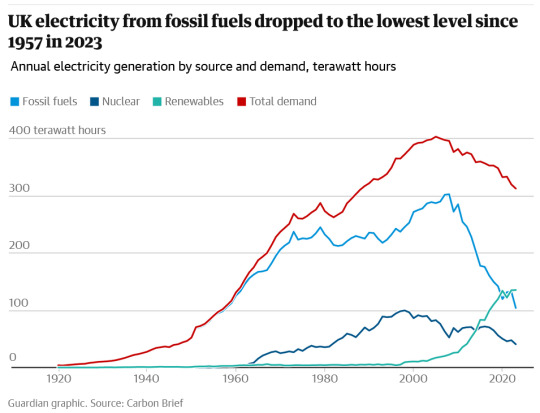
Dan McGrail, the chief executive of RenewableUK, said the data shows “the central role that wind, solar and other clean power sources are consistently playing in Britain’s energy transition”.
“We’re working closely with the government to accelerate the pace at which we build new projects and new supply chains in the face of intense global competition, as everyone is trying to replicate our success,” McGrail said.
Electricity from fossil fuels was two-thirds lower in 2023 compared with its peak in 2008, according to Carbon Brief. It found that coal has dropped by 97% and gas by 43% in the last 15 years.
Coal power is expected to fall further in 2024 after the planned shutdown of Britain’s last remaining coal plant in September. The Ratcliffe on Soar coal plant, owned by the German utility Uniper, is scheduled to shut before next winter after generating power for over 55 years.
Renewable energy has increased sixfold since 2008 as the UK has constructed more wind and solar farms, and the large Drax coal plant has converted some of its generating units to burn biomass pellets.
Electricity demand has tumbled by 22% since its peak in 2005, according to the data, as part of a long-term trend driven by more energy efficient homes and appliances as well as a decline in the UK’s manufacturing sector.
Demand for electricity is expected to double as the UK aims to cut emissions to net zero by 2050 because the plan relies heavily on replacing fossil fuel transport and heating with electric alternatives.
In recent weeks [aka at the end of 2023], offshore wind developers have given the green light to another four large windfarms in UK waters, including the world’s largest offshore windfarm at Hornsea 3, which will be built off the North Yorkshire coast by Denmark’s Ørsted."
-via The Guardian, January 2, 2024
#uk#united kingdom#england#scotland#wales#northern ireland#electricity#renewables#renewable energy#climate change#sustainability#hope posting#green energy#fossil fuels#oil#coal#solar power#wind power#environment#climate action#global warming#air pollution#climate crisis#good news#hope
394 notes
·
View notes
Text
In 1833, Parliament finally abolished slavery in the British Caribbean, and the taxpayer payout of £20 million in “compensation” [paid by the government to slave owners] built the material, geophysical (railways, mines, factories), and imperial infrastructures of Britain [...]. Slavery and industrialization were tied by the various afterlives of slavery in the form of indentured and carceral labor that continued to enrich new emergent industrial powers [...]. Enslaved “free” African Americans predominately mined coal in the corporate use of black power or the new “industrial slavery,” [...]. The labor of the coffee - the carceral penance of the rock pile, “breaking rocks out here and keeping on the chain gang” (Nina Simone, Work Song, 1966), laying iron on the railroads - is the carceral future mobilized at plantation’s end (or the “nonevent” of emancipation). [...] [T]he racial circumscription of slavery predates and prepares the material ground for Europe and the Americas in terms of both nation and empire building - and continues to sustain it.
Text by: Kathryn Yusoff. "White Utopia/Black Inferno: Life on a Geologic Spike". e-flux Journal Issue #97. February 2019.
---
When the Haitian Revolution erupted [...], slaveholding regimes around the world grew alarmed. In response to a series of slave rebellions in its own sugar colonies, especially in Jamaica, the British Empire formally abolished slavery in the 1830s. [...] Importing indentured labor from Asia emerged as a potential way to maintain the British Empire’s sugar plantation system. In 1838 John Gladstone, father of future prime minister William E. Gladstone, arranged for the shipment of 396 South Asian workers, bound to five years of indentured labor, to his sugar estates in British Guiana. The experiment [...] inaugurated [...] "a new system of [...] [indentured servitude]," which would endure for nearly a century. [...] Desperate to regain power and authority after the war [and abolition of chattel slavery in the US], Louisiana’s wealthiest planters studied and learned from their Caribbean counterparts. [...] Thousands of Chinese workers landed in Louisiana between 1866 and 1870, recruited from the Caribbean, China and California. [...] When Congress debated excluding the Chinese from the United States in 1882, Rep. Horace F. Page of California argued that the United States could not allow the entry of “millions of cooly slaves and serfs.”
Text by: Moon-Ho Jung. "Making sugar, making 'coolies': Chinese laborers toiled alongside Black workers on 19th-century Louisiana plantations". The Conversation. 13 January 2022.
---
The durability and extensibility of plantations [...] have been tracked most especially in the contemporary United States’ prison archipelago and segregated urban areas [...], [including] “skewed life chances, limited access to health [...], premature death, incarceration [...]”. [...] [In labor arrangements there exists] a moral tie that indefinitely indebts the laborers to their master, [...] the main mechanisms reproducing the plantation system long after the abolition of slavery [...]. [G]enealogies of labor management […] have been traced […] linking different features of plantations to later economic enterprises, such as factories […] or diamond mines […] [,] chartered companies, free ports, dependencies, trusteeships [...].
Text by: Irene Peano, Marta Macedo, and Colette Le Petitcorps. "Introduction: Viewing Plantations at the Intersection of Political Ecologies and Multiple Space-Times". Global Plantations in the Modern World: Sovereignties, Ecologies, Afterlives (edited by Petitcrops, Macedo, and Peano). Published 2023.
---
Louis-Napoleon, still serving in the capacity of president of the [French] republic, threw his weight behind […] the exile of criminals as well as political dissidents. “It seems possible to me,” he declared near the end of 1850, “to render the punishment of hard labor more efficient, more moralizing, less expensive […], by using it to advance French colonization.” [...] Slavery had just been abolished in the French Empire [...]. If slavery were at an end, then the crucial question facing the colony was that of finding an alternative source of labor. During the period of the early penal colony we see this search for new slaves, not only in French Guiana, but also throughout [other European] colonies built on the plantation model.
Text by: Peter Redfield. Space in the Tropics: From Convicts to Rockets in French Guiana. 2000.
---
To control the desperate and the jobless, the authorities passed harsh new laws, a legislative program designed to quell disorder and ensure a pliant workforce for the factories. The Riot Act banned public disorder; the Combination Act made trade unions illegal; the Workhouse Act forced the poor to work; the Vagrancy Act turned joblessness into a crime. Eventually, over 220 offences could attract capital punishment - or, indeed, transportation. […] [C]onvict transportation - a system in which prisoners toiled without pay under military discipline - replicated many of the worst cruelties of slavery. […] Middle-class anti-slavery activists expressed little sympathy for Britain’s ragged and desperate, holding […] [them] responsible for their own misery. The men and women of London’s slums weren’t slaves. They were free individuals - and if they chose criminality, […] they brought their punishment on themselves. That was how Phillip [commander of the British First Fleet settlement in Australia] could decry chattel slavery while simultaneously relying on unfree labour from convicts. The experience of John Moseley, one of the eleven people of colour on the First Fleet, illustrates how, in the Australian settlement, a rhetoric of liberty accompanied a new kind of bondage. [Moseley was Black and had been a slave at a plantation in America before escaping to Britain, where he was charged with a crime and shipped to do convict labor in Australia.] […] The eventual commutation of a capital sentence to transportation meant that armed guards marched a black ex-slave, chained once more by the neck and ankles, to the Scarborough, on which he sailed to New South Wales. […] For John Moseley, the “free land” of New South Wales brought only a replication of that captivity he’d endured in Virginia. His experience was not unique. […] [T]hroughout the settlement, the old strode in, disguised as the new. [...] In the context of that widespread enthusiasm [in Australia] for the [American] South (the welcome extended to the Confederate ship Shenandoah in Melbourne in 1865 led one of its officers to conclude “the heart of colonial Britain was in our cause”), Queenslanders dreamed of building a “second Louisiana”. [...] The men did not merely adopt a lifestyle associated with New World slavery. They also relied on its techniques and its personnel. [...] Hope, for instance, acquired his sugar plants from the old slaver Thomas Scott. He hired supervisors from Jamaica and Barbados, looking for those with experience driving plantation slaves. [...] The Royal Navy’s Commander George Palmer described Lewin’s vessels as “fitted up precisely like an African slaver [...]".
Text by: Jeff Sparrow. “Friday essay: a slave state - how blackbirding in colonial Australia created a legacy of racism.” The Conversation. 4 August 2022.
#abolition#tidalectics#multispecies#ecology#intimacies of four continents#ecologies#confinement mobility borders escape etc#homeless housing precarity etc#plantation afterlives#archipelagic thinking#geographic imaginaries#kathryn yusoff#katherine mckittrick#sylvia wynter#fred moten#achille mbembe#indigenous pedagogies#black methodologies
211 notes
·
View notes
Text
The U.K.'s last coal-fired power plant was to close permanently on Monday — bringing an end to 140 years of reliance on the fossil fuel to generate electricity in Britain. The move will make the U.K. the first major global economy to completely phase out coal as an energy source.
The Ratcliffe-on-Soar Power Station, located near a small village in southern England, was to close its doors for the last time at midnight local time. The power station has been generating electricity since 1967 and "played a key role in keeping the nation's lights on," its parent company Uniper said in a statement Monday.
"Since commissioning it has produced enough energy to make more than 21 trillion cups of tea and its 2GW capacity is enough to power two million homes," the company said.
Peter O'Grady, the plant's manager, told CBS News it was "an emotional day."
"When I started my career 36 years ago, none of us imagined a future without coal generation in our lifetimes. I am incredibly proud of what we've achieved together over the years and to be part of this energy milestone as the country focuses on a cleaner energy future," he said.
The move sees the U.K. make good on one of the environmental pledges made by the government as part of a wider strategy to combat climate change and achieve net-zero greenhouse gas emissions by 2050. Coal is considered the single most damaging fossil fuel for the environment, according to Greenpeace, as it releases more carbon dioxide than oil or gas. Coal also produces mercury and arsenic, and small particles of soot which contribute to air pollution.
Thirteen countries have already phased out coal as a source of energy, according to independent climate think tank Ember, but Britain will be the only member of the G7 group of economically advanced, democratic nations to do so thus far.
In the G7's largest economy by a significant margin, the U.S., the Department of Energy acknowledges that coal is still "used to generate a significant chunk of our nation's electricity" — about 16% of the total share in 2023, according to the Energy Information Administration.
U.K. Energy Minister Michael Shanks said in a statement sent Monday to CBS News that the closure of the Ratcliffe power station "marks the end of an era, and coal workers can be rightly proud of their work powering our country for over 140 years."
"The era of coal might be ending, but a new age of good energy jobs for our country is just beginning," Shanks said.
The first coal plant in Britain went online in 1882, when Thomas Edison's Holborn Viaduct coal plant started generating electricity for public use. It was a first-of-its-kind station, and it burned enough coal to provide energy to light 1,000 lamps in the City of London.
Despite efforts to make the industry cleaner, the fundamentals of coal-fired electricity generation have remained largely unchanged since Edison's company fired up its boilers. The process involves burning the fossil fuel to heat water to create steam, which spins a turbine to produce electricity.
44 notes
·
View notes
Text
Hundreds of pro-Palestinian demonstrators gathered outside the downtown Vancouver hotel where Prime Minister Justin Trudeau was speaking Thursday night to pressure him to cut off Canadian military support for Israel. Dozens of demonstrators lay under white sheets outside the Westin Bayshore hotel in Coal Harbour, where Trudeau was speaking at a private Liberal Party fundraiser. Surrounding those on the ground, several hundred more were seen waving Palestinian flags and signs saying "Free Palestine" amid the ongoing Israel-Hamas war in Gaza. Organizers with the grassroots group Independent Jewish Voices (IJV) said the event was to show solidarity with Palestinians and call on Canada to do more to end the conflict.
Continue Reading
Tagging @politicsofcanada
#cdnpoli#canada#canadian politics#canadian news#palestine#solidarity with palestine#independent jewish voices#free palestine#protests#british columbia#vancouver
286 notes
·
View notes
Text
Madeline Halpert and Jessica Murphy at BBC News:
President Donald Trump has agreed to hold off imposing 25% tariffs on Canada and Mexico for 30 days, pulling the North American neighbours back from the brink of a potentially damaging trade war. After last-minute calls with Trump, Canadian Prime Minister Justin Trudeau agreed to reinforce his country's border with the US to clamp down on migration and the flow of the deadly drug fentanyl. Earlier, Trump made a deal with Mexican President Claudia Sheinbaum. She agreed to reinforce the northern border with troops. In return the US would limit the flow of guns into Mexico. But a US tariff of 10% on Chinese imports has come into effect, after a deadline of 00:01 EST (05:00 GMT) on Tuesday passed. Shortly after, Beijing announced it was imposing retaliatory tariffs on a raft of American products, including 15% on coal and liquefied natural gas and 10% on crude oil and agricultural machinery.
Trump earlier said he planned to speak on the phone to his Chinese counterpart soon. He described the 10% import taxes as the "opening salvo" and said they could become "very, very substantial" if no agreement is made. Monday's breakthrough with Canada and Mexico came as they prepared retaliatory tariffs on American goods. After two phone calls on Monday, Trump and Trudeau posted on social media that they had reached a temporary agreement on securing the border that would avoid tariffs for at least 30 days. Both leaders portrayed the plan as a win. "As president, it is my responsibility to ensure the safety of ALL Americans, and I am doing just that. I am very pleased with this initial outcome," Trump wrote on his social media site Truth Social.
Donald Trump temporarily pauses tariffs on its neighbours Mexico and Canada for one month, but not for geopolitical foe China. Mexico and Canada called Trump’s bluff.
See Also:
Vox: Is Trump’s trade war with Mexico and Canada over?
Reuters: Trump pauses tariffs on Mexico and Canada, but not China
#Tariffs#United States#Economy#China#Canada#Mexico#Trump Administration II#Donald Trump#Claudia Sheinbaum#Justin Trudeau
28 notes
·
View notes